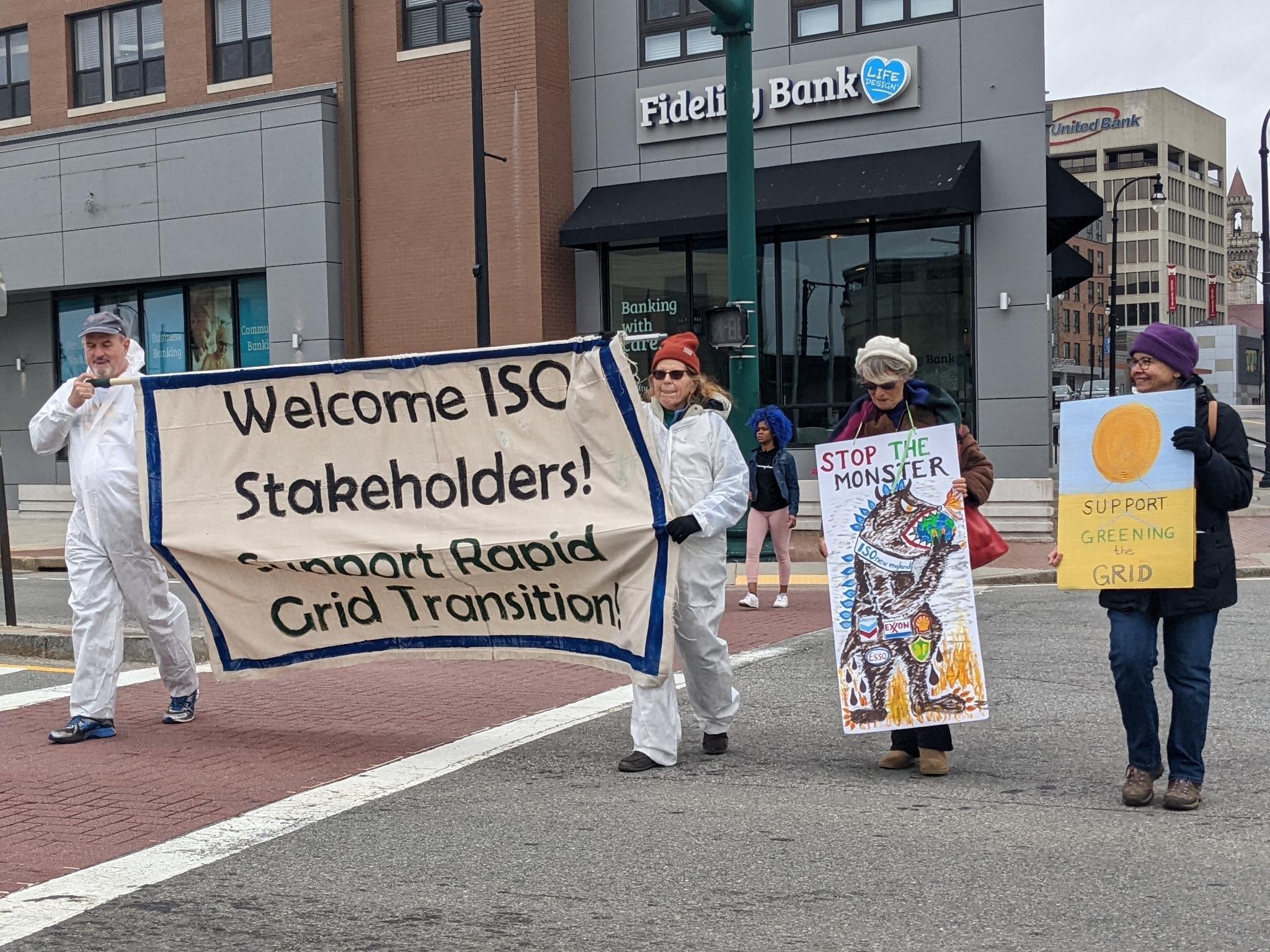FOR IMMEDIATE RELEASE: June 19, 2023
New England activists declare that ISO-New England and FERC push for additional fracked gas infrastructure serves fossil fuel interests, harms ratepayers and climate.
New England Region – The No Coal No Gas Campaign has shown since its start that dirty fossil fuel peaker plants like Merrimack Station in Bow, NH, are not only unnecessary for grid reliability, but actually threaten grid reliability by ignoring how fossil generators, by damaging climate, increase risks of extreme events. All while funneling hard-earned ratepayer dollars into the pockets of the super-wealthy who live far from the pollution inflicted on people, from coal mines to playgrounds. By focusing on shutting down Merrimack Station, No Coal No Gas advocates for a just transition to common sense, healthy, democratic, and locally-beneficial energy, in Bow and beyond.
As fossil fuel-dominated interests gather in Portland, Maine on June 20th for the 2023 New England Winter Gas-Electric Forum, we expect them to double down on rhetoric that we need even more fossil fuel infrastructure, in the name of reliability, to neutralize impacts of extreme weather events. Yet we expect that most of the panelists will be silent on lessons learned from the most recent epitome of winter reliability failure, a widespread failure of fossil fuel generators (particularly gas generators) to deliver on December 24, 2022, a cold snap when they were most needed. This is not just an example of a reliability failure – it was a moment of truth – the exact circumstance in which reliability is essential to the health and safety of ratepayers.
As in the tale of the Emperor’s New Clothes, a conversation on June 20th that purports to address winter reliability but fails to discuss this recent failure of fossil fuel infrastructure amounts to self-exposure.
No Coal No Gas seeks mindfully to step outside of systems in which we are all embedded, and from that broader perspective, notice where reform is incrementally useful but insufficient to change the status quo.
“If it comes up at all, we expect panelists to celebrate the $39M “Pay-for-Performance” payoff policy that allowed New England to escape rolling blackouts on the December 24, 2022 grid emergency,” said No Coal No Gas member and ISO-New England Comsumer Liaison Group Coordinating Committee member, Nathan Phillips. “The industry narrative is that the system worked, but this is true only insofar as an expensive financial patch was used to prevent an actual grid shutdown, while failing to address the underlying problem.”
And in the end, who ultimately pays the price? Every penny that flows from ISO-NE was supplied by ratepayers via their electric bills. Although ISO-NE claims that the financial penalties and awards handed out after December 24 are not reflected in direct price impacts on ratepayers, we know it is ratepayers who pay the winners of this ISO-NE market game and are left holding the bag when utilities demand rate hikes.
Building new gas pipelines is not the answer to gas power plant equipment failures like those which were largely responsible for last winter’s emergency. Of the entire 2.3 GW that didn’t deliver when it was needed most on that date, ISO states that 15% of the reserve margin shortfall was due to “gas scheduling issues.” In plain language, this means that sufficient gas capacity (actual physical gas) was in the transmission pipelines serving gas-fired power plants, but the inefficiency of the day-ahead and spot gas markets locked up that gas capacity so that it could not be used. This points to a reliability failure that has everything to do with the financial games built-in to the ISO market design, rather than a genuine supply shortfall. Would market rules have been suspended to let the gas flow if it came to that, or would rolling blackouts be implemented to preserve the sanctity of the gas and ISO market rules?
We also know that, on a day of fossil fuel infrastructure and market failure like last December 24th, ratepayers have the actual power to do what ISO could not: neutralize the emergency through our own collective action. If 6 million New England ratepayers each avoided a mere 55 Watts during the peak demand hour on December 22, for example by turning off a television, we would have avoided the entirety of the gas scheduling shortfall.
“As the No Coal No Gas campaign continues to shine a spotlight on the economic and environmental damage caused by the coal-fired Merrimack Station, we intend to maintain pressure on Atlas Holdings, the private equity firm that owns the generator,” said Marla Marcum, an organizer with No Coal No Gas and the Director of Climate Disobedience Center, which supports the campaign. “Atlas’s continued commitment to coal in New England is costly to ratepayers, and we are determined that private equity interests should not be profiting from this destructive and unnecessary power plant. We celebrate both our role in Merrimack Station’s failure to clear the 17th Forward Capacity Auction and our collective determination to do what must be done to end the era of coal and gas (and oil) on the grid in New England. We will continue to use our political power; our joyful, creative, disruptive actions; and our collective ratepayer power, to bring about energy democracy and a livable climate for all.”
No Coal No Gas will webcast #MysteryReliabilityTheater, with informative and humorous commentary periodically throughout the Forum. Look for the hashtag or keep an eye on @nocoalnogas on Facebook, Twitter, and Instagram for updates on when and where to catch the streams on June 20th. For background and context on the No Coal No Gas campaign, which launched late Summer 2019, see nocoalnogas.org.

